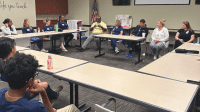It’s time for new nursing graduates to join your work environment. Will you be a supportive colleague of their entry into the profession? Will you go out of your way to make them feel welcome? Will you make the effort to ensure they understand your facility and your unit? Will you take the time to ensure that their care is safe for patients, that they become exemplary nurses you will one day feel proud to have followed in your footsteps? Or will they leave the profession prematurely because they were overwhelmed, misunderstood, frustrated, or fearful that they couldn’t be the nurses they wanted to be? To this day, I remember and want to thank the experienced nurses at University Hospitals of Cleveland who supported and demonstrated mutual respect for me as a young new nurse.
We have a nursing shortage that won’t readily go away, as the average age of experienced nurses is 47. Graduating nurses will not be able to replace those of us who retire, fall ill, or become unable to manage the demands of 8-, 10-, or 12-hour shifts or rotating or night shifts. We must do everything we can to support and encourage new graduates to succeed, realize their potential, and stay in the nursing workforce.
Thousands of new nurses will complete their nursing programs this spring. They will be anxious about taking RN-CLEX, knowing they must pass the exam and obtain a license before beginning their new jobs. They’ve been searching for that first professional job as an RN, nervous about whether they selected their career wisely and whether they have learned enough. Almost all will fear that first code. Attending the New York Student Nurses Association’s annual meeting recently, I noted that the theme was “Are We Ready?”
New graduates will be excited to be able to do something they have been working to achieve for a long time. Remember the first time you got to wear a white uniform instead of a student nurse uniform, or write RN after your name instead of Student Nurse? It was a very big deal! I still have my name pin with the letters RN after my name. Yet it was a very big shock when I realized just how hard it was to take care of several patients, to administer medications on time, without error, every shift. Hopefully, most of you had nurses who became your mentors, who took responsibility for orienting you to the unit or made sure you organized your time to care for six or eight or more patients during your shift.
Are you willing and committed to being that kind of mentor for the new RNs coming to your facility or unit? Yes, mentoring will probably add to your workload. Yes, sometimes you will be too tired to explain once more the significance of that lab value or why the physician wants it done this way. The reward, though, is seeing their eyes light up when they make the mental link themselves and realize they don’t need to ask again.
For all the excitement, passion, and fears new graduates have about their first job as RNs, what they are not thinking about is the fact that there is a huge generation gap between them and the seasoned nurses on their unit. You want them to respect your knowledge, experience and wisdom; they are hoping you will respect their computer expertise. They are anticipating that they will receive a thorough and supportive orientation to the unit. They are not expecting to be chastised, misunderstood, or unsupported because they are young. They expect information to be available electronically.
I urge you to remember your first job as a new graduate and to commit to being patient, open to questions (no matter how simple), nonjudgmental, genuine in your support, and encouraging of all of their efforts. Help ensure that these new graduates succeed and stay in the profession. One day, when either you or they depart for another nursing challenge, you can say you made a positive difference in their continued commitment to the profession. In the meantime, send me a note about the nurse or nurses who made a difference in your life, and why.
Rebecca M. Patton, MSN, RN, CNOR
President
American Nurses Association


















